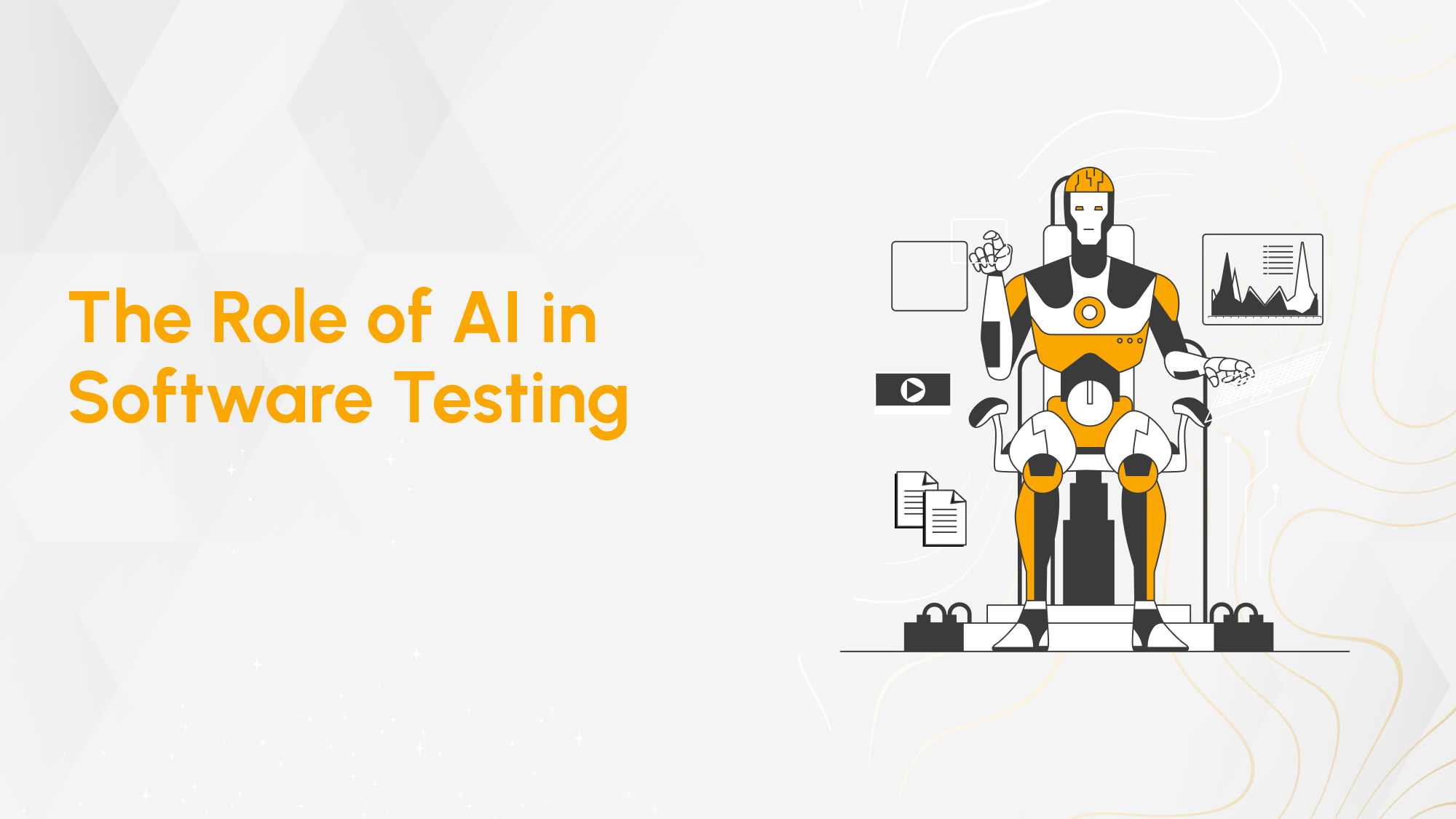The Role of AI in Software Testing

AI in software testing can be used to improve and expedite the testing procedure. Testing with the help of AI assesses a software's functionality, effectiveness, and dependability by automating data validation, error detection, and test execution.
Why Should We Consider AI in Software Testing?
Over the past few years, software releases have increased exponentially in the digital age, necessitating the need for faster, more effective testing procedures. There is a great deal of pressure to create faultless software, and everyone agrees that test automation, even in its most basic form, may greatly reduce this stress. Engaging a reputable software testing company can further streamline the process and ensure high-quality outcomes.
Benefits of Using AI for Software Testing:
1. Continuous Testing: AI facilitates continuous, round-the-clock testing and expedites test execution by automating repetitive operations, producing quicker results.
2. Reduced Human Error: AI reduces human error, resulting in more precise and reliable results.
3. Improved Test Coverage: By creating thorough test cases, including edge scenarios that humans might overlook, AI improves test coverage.
4. Cost Savings: AI-driven testing saves money by eliminating the need for manual testing and making the most use of available resources.
5. Early Flaw Detection: Using historical data and real-time monitoring, AI can anticipate and discover flaws early on and quickly identify problems.
6. Test Case Generation: AI's intelligent automation can automatically generate and update test cases in response to software modifications.
7. Effective Test Data Management: AI can build relevant test scenarios by analyzing big datasets, making test data management more effective.
8. Detailed Reporting and Insights: AI offers thorough reporting and insights that facilitate swift problem-solving and understanding.
9. Scalability: AI can grow testing efforts as needed and manage big test suites with ease.
10. Enhanced Security: AI improves application security by assisting in identifying vulnerabilities and continually scanning for threats.
11. Higher Quality Software: AI enhances the effectiveness, precision, and thoroughness of the testing procedure, resulting in higher-quality software.
Why Do We Need AI Software Testing?
AI in testing has significantly impacted software testing within the open-source community through automation, intelligent analytics, and enhanced efficiency in several ways:
1. Test Automation: AI technologies such as machine learning and natural language processing allow us to build sophisticated systems for automating tests. These systems can create test cases by themselves, run them automatically, and then examine the results.
2. Defect Prediction and Analysis: AI has the ability to analyze extensive historical data to anticipate potential defects in software, allowing testers to concentrate on critical areas.
3. Log Analysis: AI algorithms can sift through large amounts of log files to detect unusual events, mistakes, or recurring patterns, improving overall system dependability.
4. Enhanced Test Case Generation: AI methods can create test cases using input details, code updates, or user interactions, saving time and ensuring comprehensive testing.
5. Performance Testing: AI-powered tools can simulate thousands of virtual users to conduct load and stress tests, ensuring applications can manage high levels of activity.
6. User Experience Testing: AI can imitate user interactions to check for ease of use and accessibility, ensuring the software meets user expectations.
7. Continuous Integration and Deployment (CI/CD): AI automates tests in CI/CD pipelines, ensuring the software meets high standards through tasks like code reviews and deployment verification's.
8. Open-Source AI Tools: The open-source community has created many AI-driven testing tools and libraries like TensorFlow, Selenium, and Apache JMeter, making advanced testing capabilities accessible to developers worldwide.
9. Bug Detection and Triage: AI algorithms can find, categorize, and rank bugs by severity, helping teams focus on fixing the most critical issues.
10. Adaptive Testing: AI can change testing strategies based on immediate feedback and new needs, ensuring tests remain relevant and accurate.
Benefits of AI in Test Automation
Incorporating AI into testing brings numerous advantages:
1. Enhanced Accuracy
AI improves accuracy by leveraging advanced algorithms for pattern recognition and data analysis, identifying subtle defects that manual testing might miss.
2. Expanded Test Coverage
AI extends test coverage by adapting to evolving requirements and learning from previous test results, ensuring a dynamic testing process.
3. Efficient Test Creation
AI automates repetitive tasks, boosting efficiency and speeding up testing cycles, leading to quicker issue resolution and faster time to market.
4. Streamlined Test Maintenance
AI adapts to software changes, reducing maintenance efforts and allowing testing teams to focus on strategic tasks.
AI Tools Available in the Market
Open-source AI tools for software testing play a major role in enhancing test coverage and improving overall software quality. Notable open-source AI tools include:
1. Apache JMeter: Originally for load testing, JMeter now includes functional testing with AI plugins for performance prediction and analysis.
2. TensorFlow: Used for machine learning, TensorFlow assists with predicting test outcomes, spotting problems, and creating new tests.
3. Appium: Automates mobile app testing with AI for smart test cases and automatic UI tests.
4. Apache PredictionIO: Simplifies machine learning for predicting software issues and planning better tests.
5. Katalon Studio: Uses AI plugins for automatic test case creation and smart test data management.
6. Test.ai: Creates and runs UI tests for mobile apps, improving effectiveness with machine learning.
7. Apache Mahout: Uses machine learning to predict software issues and improve app performance.
8. Robot Framework: General testing tool that can integrate AI for problem-solving.
9. AutoTest: Utilizes AI and machine learning for automatic test creation and execution.
AI Usages in Testing
1. Automating Unit Test Generation: Jtest leverages AI to generate comprehensive unit test suites, automating mocks and assertions for effective regression testing.
2. Automating Unit Test Parameterization: Enhances static analysis and unit testing with AI-driven automatic test case generation.
3. Automating API Test Generation & Maintenance: AI-based API Test Generator uses reasoning and machine learning for comprehensive test creation and maintenance.
4. Generative AI for API Scenario Test Creation: Utilizes machine learning to automate API test scenario generation, enhancing coverage and adaptability.
5. Self-Healing Selenium Tests: Machine learning addresses common challenges, providing self-healing at runtime for UI test execution.
Challenges of AI-based Software Testing:
1. Insufficient Data Quality: High-quality data is essential for accurate AI model training, but collecting accurate data can be difficult.
2. Cost and Complexity: Integrating AI into testing requires a robust infrastructure and skilled professionals, making it costly and complex.
3. Model Bias: AI models may struggle to identify defects beyond known patterns if trained with specific types of defects.
Conclusion
In summary, AI in software testing is increasingly important as technology advances. Automated processes improve accuracy, efficiency, and coverage. With future innovations like IoT, robotics, and quantum computing, the role of AI in testing methods will need to evolve. Embracing these AI advancements now ensures our software applications remain robust and reliable.
FAQ's
1. How can AI be used in testing?
AI can be used in software testing to automate repetitive tasks, predict defects using historical data, and generate test cases. AI in testing can enhance test coverage, improve accuracy, and save time.
2. Will AI take over software testing?
While AI is transforming software testing by automating many tasks, it won't completely take over. Human testers are still needed to handle complex scenarios and provide insights that AI testing tools can't replicate.
3. What are the 3 major benefits of using AI in software testing?
Three major benefits of using AI in software testing are increased accuracy, improved test coverage, and cost savings. AI testing tools can also help in detecting defects early and reducing human error.
4. Will AI take away QA jobs?
AI will not take away QA jobs but will change them. QA professionals will focus more on strategic tasks and complex problem-solving, while AI software testing tools handle repetitive and time-consuming tasks.
